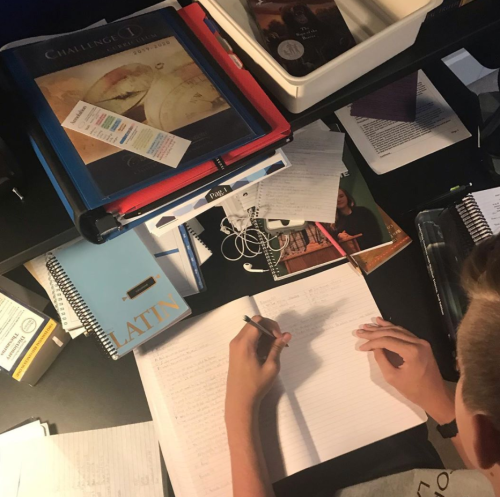A well-rounded homeschool high school program includes at least two years of a foreign language.
When we talk about benefits of homeschooling high school, this one is at the top of my list! The world is your oyster when it comes to what language you and your child decide they will pursue.
There are many resources for learning a foreign language in the high school years.
Let’s talk about the approach we have used in our homeschool with foreign language. I hope it provides you with some direction and practicality - as well as a favorite resource or two!
Start with Latin
The pre-high school language requirement in our homeschool is Latin.
I could go on and on about the benefits of Latin - our whole family has a better grasp of language because of Latin.
Because of our involvement in Classical Conversations, Latin has been a part of our schooling from little on. I love the way we gently memorized declensions and conjugations through song.
We also included a wonderful book, Getting Started with Latin, in our morning basket for several years. These were short, gentle lessons that I could work through with both of my children at the same time. I LOVE this resource.
Formal Latin studies began in 7th grade, using the Henle Latin books in Classical Conversations Challenge A.
Learning Latin this way was very self-directed, which will work well for some children - but not for others.
My son did well learning on his own (and with the help of his Challenge tutors and myself), using Latin with Andy, and other resources offered through Classical Conversations.
My daughter, however, needed more expert teaching, so we enrolled her in the Memoria Press Online Academy Henle Latin courses. This was a wonderful experience for her, and was also a good opportunity to learn in more of a traditional classroom environment.
Whatever the case, I required my children to have two years of formal Latin learning by the 9th grade.
Pick Your Next Language (If That’s Your Thing!)
Because my daughter completed two high school credits of Henle Latin, I think she was DONE with foreign language. She also didn’t have the love for language my son has - so she decided to take the two credits of Latin and call it a day.
We homeschool because our children possess different strengths and we want to tailor their education accordingly.
As I noticed my son’s affinity for language, I encouraged him to take a second language when he got to 9th grade. I only attempted this because we were homeschooling. I could fully control his Latin assignments, so if at any time it became burdensome we could adjust.
A few years ago I traveled to Ecuador on a mission trip with Operation Christmas Child. A couple months later my husband traveled to Honduras on mission with our church. We had the Spanish language swirling in our heads, and the people of Spanish speaking countries in our hearts.
Spanish has so much in common with Latin; it seemed like the next logical step for Grant. He agreed, so I began investigating options for him to take Spanish online. I wanted an opportunity for him to learn from a native speaker - preferably in a one-on-one situation.
I will admit that Grant was NOT 100% on board with this. I had to PUSH him and pretty much require it in the beginning. Yes, I believe in letting our children determine their path in high school, but I am still in charge of their education and do believe I know best.
Homeschool Spanish Academy
Grant is completing his first year with Homeschool Spanish Academy.
We have been extremely pleased with the model of instruction and the progress he has made.
Their model of instruction is a bit different - but here are a few things for you to know:
One-on-one instruction; teacher located in Guatemala - lots of conversing in SPANISH during the classes
You schedule your individual classes - and choose your own teacher for each class (we have one that we have really liked and have chosen her as much as possible)
Receive instruction and then complete homework
Submit homework via their website - quizzes are taken in class
Parent “conferences” occur at strategic points during the course
To this point, Grant has. completed 1 full credit of Spanish. When you login to your account you can see the syllabus, all grades, and credits earned. I like that he is accountable, conversing a lot in Spanish, and then telling ME everything he has learned!
You can take a preview class - which is what sold us on Homeschool Spanish Academy. I highly recommend you do this if you are interested.
I know that high school and credit requirements can seem daunting. These posts may also help:
The Homeschool Journey to College
Homeschool High School: Don’t Lose the Wonder
Is your child currently taking a foreign language?
Which one?
Or, if you’re not quite there yet, what are your plans?
*Disclaimer: Last year I found Homeschool Spanish Academy and was quite impressed by them. I asked if Grant could take the classes in exchange for my honest review. This is that honest review - I’m so happy with Spanish this year and he will be continuing with Homeschool Spanish next year.






